Married and Buried: Punk As A Four-Letter Word, Part One
Published on January 30th, 2008 in: Issues, Music, Retrovirus, We Miss The Nineties |By Less Lee Moore
When others become misty-eyed with nineties nostalgia, I never know what to say. I’ve often felt like my memories of the decade are far removed from theirs. Although I liked some of the so-called “grunge” music, I resented the media co-opting of the word in an attempt to cash in on youth culture. It’s only recently that I started to feel like I may have been more attuned to the zeitgeist than I realized.
During the early years of the nineties, I was in the throes of a musical ennui, searching desperately for something to erase the bloated years of the late eighties. Then I discovered a band that would revolutionize my musical tastes: Redd Kross.
(You thought I was gonna say Nirvana, didn’t you?)
I was familiar with their pop trash aesthetic from the Lovedolls movie soundtracks, but it wasn’t until I heard Third Eye that I began to love them. Attempts to purchase everything they ever recorded soon followed. I thought Neurotica was brilliant, particularly “Play My Song” which I think sums them up best, even today: “We are not stupid boys but we want to do it wrong.” That was the most punk rock thing I’d ever heard, even though the song came out in 1987, not 1977. After Phaseshifter came out in 1994, the deal was sealed.
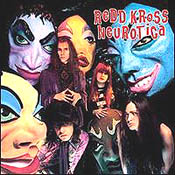
Redd Kross: Neurotica
Every band Redd Kross referenced, whether seriously or sarcastically, became a new clue in a musical scavenger hunt. This was a band that took much of the music I loved—The Beatles, hardcore, classic rock—and smashed it to a million pieces, gluing it back together with a fascinating mixture of things I either never heard before or didn’t fully appreciate: Os Mutantes, The Runaways, Cheap Trick, and The Cowsills.
Through Redd Kross, I started listening in earnest to bands like Teenage Fanclub, Shonen Knife, The Muffs, and Pat Smear. I became so enthused about music again that I started a fanzine, the most exhilarating and educational endeavor I’ve ever embarked upon.
In the October 2007 issue of Chart magazine, Aaron Brophy declared that “grunge is dead: let’s keep it that way.” I’ve never read a Brophy editorial I didn’t like, but this one rattled me. While I support his protestations against “grunge nights” at Toronto dance clubs and bars, I think his reference to grunge as “an endless stream of Stone Temple Pilots songs” is way off the mark.
And this is where Nirvana comes in.
Like many, I was affected enough by Kurt Cobain’s suicide to write about it. But, to be honest, I was never really a Nirvana fan. Most of the people I knew who liked Nirvana were the kinds of guys who would make sexist comments to my face or cut class to play volleyball with their frat brothers. Nirvana’s startling, sudden ascendancy to being The Band That Mattered rubbed me the wrong way.
When I heard Nirvana hired Pat Smear as a touring guitarist, however, I was impressed. And after I saw Dave Markey’s 1991: The Year Punk Broke, I began to warm up towards them a bit more, watching their MTV Unplugged special and thinking they weren’t half bad. Even with my limited knowledge, I was savvy enough to realize they were much cooler than Stone Temple Pilots. After all, on the cover of Rolling Stone, Kurt Cobain wore a DIY Flipper t-shirt, a band I remembered fondly from the 1981 Let Them Eat Jellybeans compilation.
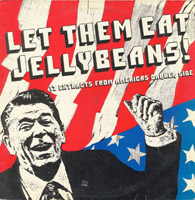
Still, I was distrustful. Cobain seemed so surly and humorless all the time. Was his punk rock cred just a guise? Before I had a chance to figure it out, he was dead.
The news of his death broke on Friday, April 8, 1994. I remember feeling stunned that someone who’d been so famous and well-loved was screwed up enough to take his own life. (I was fairly naïve about celebrity at the time.) The continuing media coverage of Cobain’s death was disgusting. MTV rapidly stitched together a montage of video clips to pay “tribute” to the band that had boosted their sagging credibility. Newsweek used Cobain’s photo in a suicide cover story. Soon “Smells Like Dead Cobain” t-shirts started popping up.
Ironically, it was only after Cobain’s death that I was able to give Nirvana’s music a chance. The more I listened to them, the more I was irritated with mainstream culture for co-opting what was obviously a good band; I was equally irritated with myself for avoiding their music for so long.
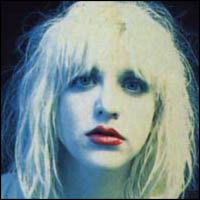
Courtney Love in better times.
I wasn’t ambivalent about Courtney Love’s band, Hole. I thought Live Through This was smashing. I perceived Love’s negative press as a witch-hunt and although I witnessed much of her media coverage, I wasn’t convinced that she was evil.
Through my fanzine, I got a press pass to interview Veruca Salt, who was opening for Hole at their New Orleans show. After I finished the interview, mayhem ensued: Love was distraught, demanding that everyone leave the backstage area. People seemed genuinely scared. What followed was the biggest train wreck of a show I would ever see.
Love was a disaster: makeup smeared, clothes disheveled, hair askew, ranting about possibly being pregnant with Trent Reznor’s baby. It was horrific. I can’t recall if the audience heckled her, stood in stunned silence, or simply left. I was so bothered that I wrote an “Open Letter To Courtney Love” for the next issue of the zine. Essentially, I was torn: anyone whose husband killed himself, leaving behind a small child, had an obvious right to be distraught and ranting. But there was an undeniable histrionic aura, like an attention-starved teenager throwing a fit.
Within a year, she and daughter Frances were living in New Orleans while author Poppy Z. Brite was writing Love’s biography. One day, my friend Laura, who carried my zine in her indie record shop, called me. Courtney Love had been to the shop, read my “Open Letter,” and demanded to speak with me, leaving a note for me to read. I asked Laura to tell me what the note contained, my heart pounding. The note seemed like something your friend would put in your high school locker, not like something Courtney Love would pen after reading a less-than-flattering show review. Courtney thanked me for the letter, telling me it was “super nice,” which I thought was weird. I guess she seized upon the sympathetic parts and ignored everything else.
A few days later, I attended the Cheap Trick show with my zine partner. Suddenly, Courtney Love and the rest of Hole walked by. We approached her and she immediately invited us backstage with her to meet Cheap Trick.
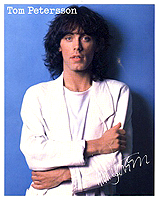
Cheap Trick’s Tom Petersson
It wasn’t hard to say yes to that proposal. Love was stunning, in a gorgeous velvet outfit and hair she’d recently colored black. All my misgivings about her vanished: she was incredibly nice, charming, funny, and happy to indulge us with gossip about Redd Kross.
Eventually, she and Frances moved out of New Orleans. I never did get that interview.
I saw The People Vs. Larry Flynt and thought Courtney was outstanding. I was less impressed with Hole’s Celebrity Skin album, which I thought was soulless and disappointing. And not long afterwards, insanity took hold of her once again: charges of assault, drug possession, breaking and entering, and public drunkenness seemed ubiquitous in the press. She flashed her breasts at David Letterman and let some stranger suckle at them in a fast food restaurant. And cameras caught it all.
Even though I was horrified by these public displays of crazy near the start of this new millennium, I felt bad for her. In fact, I agreed with her stance against the RIAA. I defended her whenever she came up in conversation, much to the annoyance of Nirvana fans who had always hated her. I scoffed at the notion she’d hired El Duce of the Mentors to kill Kurt Cobain (and knowing of her twisted sense of humor, I wouldn’t be surprised if she created that story to screw with people’s heads).
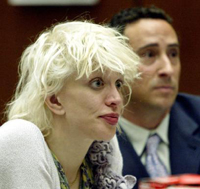
However, as her descent into oblivion continued, I began to think she was destroying any credibility, intelligence, or talent she once had. Still, I defended her during the controversy that ensued when she held onto the unreleased Nirvana track “You Know You’re Right.” And I defended her when she lost custody of Frances Bean.
Although much of her 2004 album, the ironically titled America’s Sweetheart, was totally intolerable, I actually liked some of the songs. I was baffled by the collaborations with Linda Perry (not to mention the thanks she gave to Kirstie Alley and Scientology), but in my opinion, there was no denying that there was talent lurking behind the copious drug use.
I even defended Courtney when I saw her on a Canadian television interview, looking like an overweight drag queen, talking about practicing Buddhism while she name-dropped celebrity friends. I had no idea how much I’d change my mind about her in the very near future.
6 Responses to “Married and Buried: Punk As A Four-Letter Word, Part One”
January 31st, 2008 at 3:29 pm
Seeing Courtney and HOLE blow BABES IN TOYLAND the hell off the stage (can’t actually remember when/where: 90′-91 in Minneapolis, perhaps?) was one of Thee Great Rock N Roll Moments of my sheltered Gen-X life. Oooh man they were soooo great. That one show earned Courtney, in my book, a free pass to talk all the shit she wants – FOREVER AFTER.
January 31st, 2008 at 3:31 pm
Believe me, I understand. I guess you’ll have to wait for Part Two, mwahahaha!
LLM
January 31st, 2008 at 10:15 pm
I didn’t know Poppy Z. Brite wrote Love’s bio. I admit to some curiosity about how she worked her ubiquitous male homosexuality into it. Did she connect Kurt with someone? Michael Stipe? Morrissey? Then again, I haven’t read any non-fiction of hers, so it may not have touched on such things…
I also didn’t know how many musicians you’ve met and/or connected with on some level. Cool stuff.
Looking forward to the next entry.
February 1st, 2008 at 8:31 am
I’ve not read Brite’s bio actually. Oops, don’t tell. She’s actually been a huge champion of the recovery efforts in New Orleans, post-Katrina. Her commentary has been insightful and well-written, so I definitely want to read some of her fiction.
Her LiveJournal is great, you should check it out: http://docbrite.livejournal.com/
I’m glad you liked Part One!
LLM
February 16th, 2008 at 11:25 pm
Can’t wait for part two…this is bound to be very interesting!
February 17th, 2008 at 11:41 am
Thanks, glad you like it!
LLM
Time limit is exhausted. Please reload the CAPTCHA.